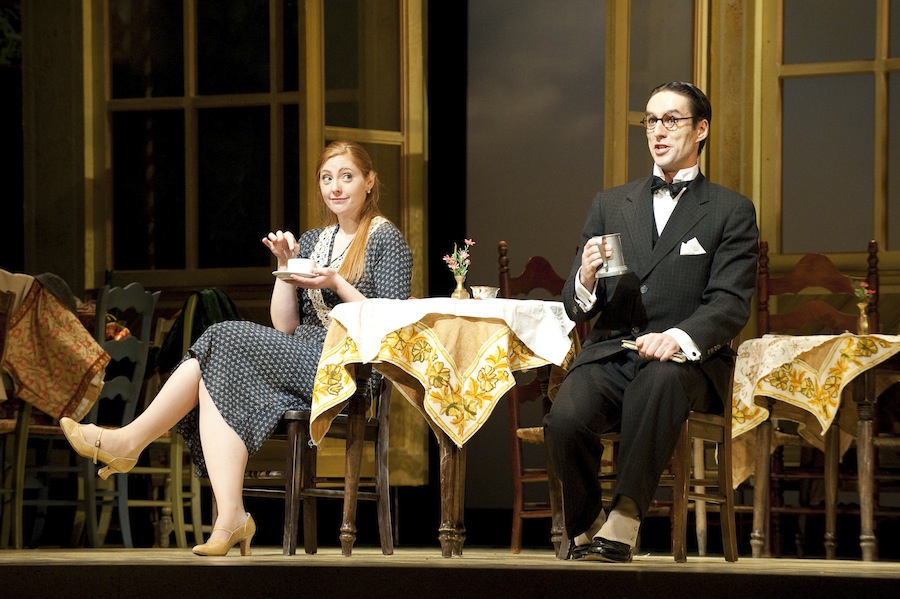Levine leads superb young cast in a winning “Bartered Bride” at Juilliard

Layla Claire as Mafenka and Alexander Lewis as Vasek in Smetana's "The Bartered Bride" at Juilliard.
One of the gems of the Metropolitan Opera’s mega-set of CDs commemorating James Levine’s 40th anniversary is a 1978 Bartered Bride with Teresa Stratas, Nicolai Gedda, Marti Talvela and, as the tenor lead’s stuttering half-brother Vasek, Jon Vickers. These singers are now history (even though all but Talvela are still alive), yet Levine soldiers on.
Tuesday night he once again conducted Smetana’s irresistible Czech comedy, in a new production by Stephen Wadsworth—the first venture of a new partnership between the Met and Juilliard for producing operas with casts drawn from the young artist programs of both institutions.
At the time the partnership was announced, Levine said, “This opera is always a pleasure for everyone,” an observation that can’t literally be true—sometime, somewhere someone has surely sulked through a performance of The Bartered Bride—but Levine’s formulation aptly captures the mood of the audience in Juilliard’s Peter Jay Sharp Theater.
New York has had too few opportunities to experience the results Levine is capable of achieving with young singers—Tanglewood has been luckier, where he annually leads (health permitting) an opera cast with Music Center Fellows—which makes this production especially welcome.
It helps that Levine is artistic director of the Met’s Lindemann Young Artist Development Program and as such ensures the quality of its membership. Still, I doubt that many in the audience expected a level of vocalism as high as that displayed last night. It contributed mightily to a rewarding performance of this tale, in which true love prevails over parental manipulation of their offspring’s marital fates.
In the title role is Layla Claire as Marenka, who loves Jenik but is told she must marry Vasek (unaware that the two are related), a prospect she fiercely resists. Claire, who has also appeared with Levine at Tanglewood, sang with a beautifully resonant, iridescent voice that is sure to destine her for a significant career. She also showed a wonderful grasp of the role’s different facets. For instance, in her duet with the hapless Vasek, she deftly balances a slightly mischievous side in trying to convince him that Marenka is a shrew and would cheat on him (he thinks she is someone else) with a genuineness that earns his trust. And Claire made an emotional high point of the tender aria near the end, when Marenka thinks (wrongly) that Jenik has betrayed her, which she followed up with some convincingly assertive singing in confronting him.
Paul Appleby, as Jenik, also contributed his share of robust, ardent singing. An engaging stage personality, Appleby excelled in his scene outwitting the marriage broker Kecal. The voice could have a bit more liquid smoothness for my taste, but Appleby gives a confident performance.
His very different half-brother Vasek benefited from a winning performance by Alexander Lewis. The tenor dealt with the character’s stuttering adeptly and amusingly but also managed to shape a sufficient number of legato phrases to alert one to a voice of exceptional sweetness and beauty. Also excellent is Jordan Bisch, who sings Kecal with an imposingly rich, well rounded bass.
The other singers are uniformly strong too, not least the mezzos Jennifer Johnson Cano and Renée Tatum as the respective mothers of Marenka and Vasek.
From the vibrant start of the overture, one could sense that Levine was delighted to be involved with this splendid opera, so rich in both Czech local color and musical sophistication. Playing by the Juilliard Orchestra was not flawless but easily comported with the spirit of the occasion.
Like many of Wadsworth’s productions, three of which are now familiar from the Met, this one is intelligent and true to the work without having a terribly strong personal edge. Thomas Lynch’s décor sets the opera in the village tavern, where people read newspapers, do their needlepoint and generally hang out. Martin Pakledinaz’s costumes range from rustic Czech to black tie for Vasek’s well-off family. The opera is updated to 1938, but you wouldn’t know it from the production, to say nothing of the opera’s upbeat tone, until the circus ringmaster in Act 3 announces that his troupe will present a true Czech circus, not the kind of thing you’d find in Stalin’s Moscow or Hitler’s Berlin—gulp.
Choreographer Benjamin Millepied’s decision to integrate the principals in the dances proved especially inspired when Vasek offered a show biz routine during the Dance of the Comedians. The production, in an expanded version, is expected to go to the Met in a future season.
Another thing this effort has going for it is a new English translation by the accomplished librettist J. D. McClatchy that respects both the opera’s wit and its sentiment. And experiencing an opera in the intimate Sharp Theater—so different from New York’s usual cavernous opera venues—is, to borrow Levine’s words, always a pleasure for everyone.
The Bartered Bride will be repeated 8 p.m. Thursday and 2 p.m. Sunday at Juilliard’s Peter Jay Sharp Theater. Both performances are sold out but turn-back tickets may be available. 212-769-7406; juilliard.edu.